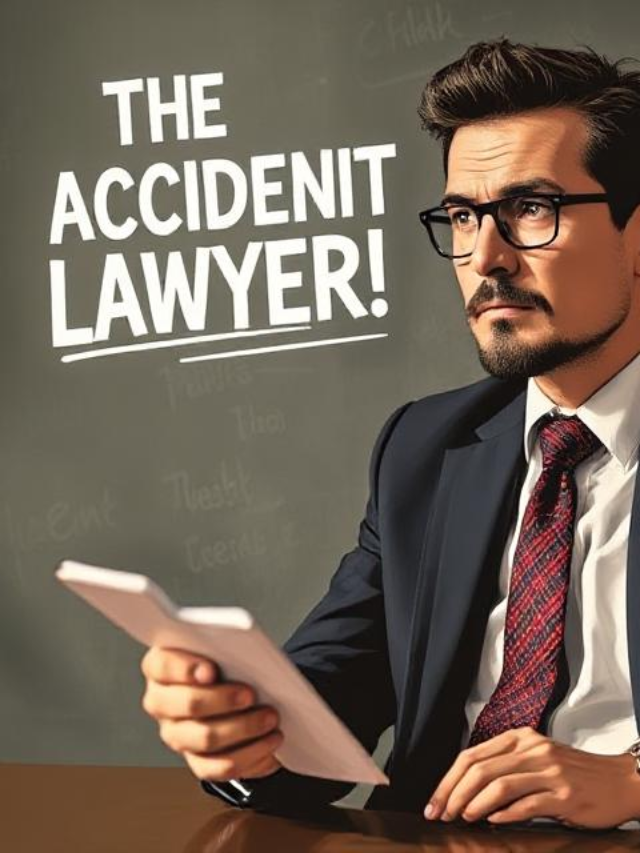Introduction to Accidental Attorneys
Accidental attorneys represent a unique facet of the legal landscape in the United States. These individuals often find themselves in the role of legal representatives, despite lacking the formal education and training traditionally associated with practicing law. The term “accidental attorney” typically applies to those who, through various circumstances, undertake legal representation without possessing a law degree or a license to practice. This situation may arise in diverse contexts, often stemming from personal experiences, familial obligations, or community needs.
Several factors contribute to individuals assuming the role of accidental attorneys. For instance, some may be motivated by a personal experience resulting from an auto accident or a car accident involving a loved one. Driven by a strong desire to seek justice or financial compensation, they may attempt to navigate the complex legal system independently. Others may feel compelled to assist friends or family while facing legal challenges, leveraging their understanding of certain issues despite lacking formal qualifications. Additionally, some accidental attorneys may operate within small communities where access to licensed legal help is limited, thereby stepping in to fill a gap in representation.
The implications of having accidental attorneys represent clients can be profound. On one hand, these individuals may possess valuable insights into specific issues, such as the emotional and psychological toll of an accident, which can sometimes inform their approach. However, their lack of formal training can lead to significant challenges. Clients may face risks associated with inadequate legal advice, which could result in unfavorable outcomes. Furthermore, the legal system, in its complexity, often requires familiarity with procedural rules and regulations that accidental attorneys may not fully grasp. This scenario raises questions about the integrity of legal representation and underscores the necessity of professional legal expertise in navigating matters such as attorney accidents and auto accidents. It is crucial for clients to understand these dynamics when considering their options for legal representation.
The Legal Framework Surrounding Accidental Attorneys
In the United States, the legal framework governing attorneys is primarily established at the state level, with each state implementing its own set of regulations and licensing requirements. To practice law and represent clients, individuals must typically pass a state bar examination after completing a law degree from an accredited institution. This ensures that licensed attorneys possess the necessary knowledge and skills to provide competent legal representation, including handling cases related to accidents, such as those involving personal injury or auto accidents.
Accidental attorneys refer to individuals who, through a lack of knowledge or misunderstanding of the law, may find themselves providing legal advice or representation without the appropriate credentials. This can lead to significant legal issues. For instance, offering legal counsel without a license constitutes the unauthorized practice of law, which can result in severe penalties, including fines and restrictions on the individual’s professional activities.
Moreover, the distinction between licensed attorneys and accidental attorneys can have serious implications for clients seeking legal help. For those involved in car accidents, hiring a qualified attorney is paramount to ensure that their rights are protected, and they receive proper compensation for damages incurred. Attorneys for auto accidents are trained to navigate the complexities of personal injury law, negotiate with insurance companies, and represent clients effectively in court. On the contrary, accidental attorneys may not have the requisite expertise, risking detrimental outcomes for clients.
The legal standards surrounding the practice of law serve to protect individuals from potential harm that may arise from inadequate legal representation. It is essential for individuals seeking legal assistance, especially in matters involving accidents, to verify their attorney’s credentials to avoid the pitfalls associated with accidental attorneys. The licensing system not only safeguards clients but also elevates the standards within the legal profession as a whole.
Common Scenarios Involving Accidental Attorneys
Accidental attorneys emerge in various scenarios where individuals, albeit without formal legal training or a clear attorney-client relationship, are drawn into situations that bear legal implications. One common instance is when family members represent each other in small claims court. In these situations, an individual may step in to advocate for a relative, such as a parent assisting a child or a spouse supporting their partner in securing justice over a disputed matter. Although their intentions are typically rooted in care and support, such actions can inadvertently expose them to liabilities typically reserved for licensed attorneys, blurring the lines of legal representation.
Another notable scenario is found within communities, where well-meaning individuals may provide legal advice or guidance based on their understanding or personal experience. An example could be a retired professional who offers insights into navigating legal documents or processes, believing they are assisting others in need. While their knowledge might be beneficial, there is a risk that the information provided may be misinterpreted or incorrect, potentially leading to unintended legal consequences. In some instances, these community members may be viewed as accidental attorneys simply due to the advisory role they undertake, despite lacking qualifications.
Moreover, certain professionals who have no formal legal education may find themselves acting as accidental attorneys while executing their job responsibilities. For instance, someone in a managerial position may inadvertently give advice on employment disputes, believing they are merely utilizing their expertise to resolve conflicts. However, their guidance can inadvertently create an expectation of representation, which could lead to complications if the matter escalates. Overall, while these accidental attorneys offer assistance in good faith, their roles highlight the intricacies of legal responsibilities that can arise outside the traditional lawyer framework.
Risks and Consequences for Clients and Accidental Attorneys
The decision to hire an attorney following an accident is crucial for the outcome of a legal case. However, engaging accidental attorneys—those who may have limited experience dealing with personal injury or auto accident cases—can introduce various risks for clients. One significant concern is the potential for inadequate legal advice. Accidental attorneys may lack the expertise necessary to navigate complex accident claims effectively, leading to missteps that could compromise the client’s case.
For instance, these attorneys might overlook critical timelines for filing claims or fail to gather essential evidence that supports the client’s position. Such oversights can result in the dismissal of a case or a significantly reduced settlement offer. Additionally, clients may find that accidental attorneys are not as familiar with negotiation tactics required to deal with insurance companies, which often leads to unsatisfactory outcomes. It is essential for clients to recognize that an attorney’s specialty directly influences their ability to advocate effectively on behalf of the injured party.
Conversely, accidental attorneys themselves face unique risks, including potential legal repercussions. Practicing outside one’s area of expertise can expose them to claims of malpractice or negligence, especially when a client’s case suffers due to inadequate representation. Additionally, these attorneys might grapple with ethical dilemmas, finding themselves torn between their professional obligation to serve the client and their limitations in offering competent legal guidance. This can create stress and frustration, impacting not only their career but also the quality of service provided to clients.
Ultimately, both clients and accidental attorneys must be aware of these risks. Clients are encouraged to conduct thorough research before hiring legal representation to ensure they are procuring the services of qualified attorneys for auto accidents. On the other hand, accidental attorneys should recognize the importance of continuing education and specialization to maintain their practice’s integrity and better serve their clients.
The Role of Paralegals and Legal Assistants
In the realm of legal services, a crucial distinction exists between accidental attorneys and well-trained paralegals or legal assistants. Accidental attorneys may find themselves navigating the legal system due to unforeseen circumstances but lack the formal education and training typically demanded for practicing law. In contrast, paralegals and legal assistants are trained professionals who provide essential support to attorneys, particularly in the context of cases involving auto accidents or personal injury.
Paralegals often hold a certification or degree in paralegal studies, which equips them with the necessary skills to assist in legal work efficiently. Their role includes conducting legal research, drafting documents, and managing case files, thereby allowing attorneys to focus on complex legal matters. For instance, in cases where individuals seek to file claims related to auto accidents, paralegals can facilitate the collection of evidence and help organize the necessary paperwork, providing value to both the attorney and the client.
While paralegals do not represent clients in court or provide legal advice, they play a prominent role in ensuring that the day-to-day operations of a law office run smoothly. They have the expertise to assist in cases involving attorneys for car accidents, guiding clients through the intricacies of filing a claim and understanding the legal procedures that accompany their cases.
Legal assistants, much like paralegals, offer administrative support but might not possess the same level of specialized legal training. However, both professions significantly contribute to the legal process by alleviating the workload of attorneys and improving client service. Therefore, understanding the respective roles of accidental attorneys, paralegals, and legal assistants is essential for anyone navigating the legal landscape, especially in situations where professional legal advice is paramount.
Ethics and Best Practices for Accidental Attorneys
Accidental attorneys, individuals providing legal guidance outside their professional qualifications, must adhere to a strict code of ethics to protect themselves and their clients. One of the foremost considerations is recognizing the limits of one’s legal knowledge. A clear understanding of personal expertise is essential; individuals should avoid offering advice on complex legal issues outside their competencies, particularly in matters such as vehicle accidents. Misguided legal counsel could lead to severe repercussions for both the accidental attorney and their clients.
When faced with questions that surpass one’s legal understanding, seeking professional help is paramount. If an individual is unsure about a specific legal matter—perhaps even regarding an attorney accident—it is critical to refer clients or peers to qualified attorneys for auto accidents or car accidents. This not only ensures informed and accurate legal advice but also upholds the integrity of the individual offering guidance. Recognizing when to step back signals professionalism, ensuring that clients receive the best possible assistance for their matters.
Moreover, maintaining transparency with clients is a foundational ethical practice. Accidental attorneys should always inform clients of their status and limitations, clarifying that they are not licensed professionals and, therefore, cannot guarantee favorable outcomes. Providing full disclosure about one’s qualifications fosters trust and helps clients make informed decisions about their legal representation. It also positions the accidental attorney as a responsible individual who respects the legal framework, emphasizing that their intent is to assist rather than to mislead.
In conclusion, adherence to ethical standards and best practices is vital for accidental attorneys. Recognizing the limitations of one’s legal knowledge, seeking professional help when necessary, and maintaining transparency with clients can effectively navigate the complex landscape of legal guidance. These practices not only protect the accidental attorney but also safeguard clients’ interests in matters such as attorney accidents and related issues.
Case Studies of Accidental Attorneys
Accidental attorneys often emerge in situations where individuals take on legal matters without the proper training, and their experiences underscore the complexities of the legal system. In one case, a small business owner decided to represent himself in a contract dispute involving a supplier. Lacking expertise in contract law, he filed the necessary paperwork but failed to include critical evidence that would have supported his claim. As a result, the case was dismissed due to lack of substantial proof. This scenario highlights the necessity of seeking the assistance of qualified attorneys for auto accidents and related legal disputes, as overlooking essential documentation can significantly hinder one’s position in court.
Another illustrative case involved a friend of the victim of a car accident who believed he could navigate the claims process without legal representation. The victim suffered severe injuries, and the claims process became increasingly complicated due to conflicting accounts from witnesses and the insurance company. Despite his good intentions, the friend struggled to compile medical records and establish a coherent narrative of events. Frustrated by the complexities, he eventually sought help from experienced attorneys for car accidents. The transition proved beneficial; the attorneys were able to negotiate a fair settlement that the victim initially might have forfeited. This exemplifies how engaging seasoned legal professionals can yield favorable outcomes and avoid misunderstandings in intricate legal matters.
In yet another case, a coworker attempted to assist an employee who had sustained an injury on company premises. Lacking proper legal knowledge, this individual inadvertently provided incorrect information regarding workers’ compensation claims, which delayed the injured party’s access to benefits. The affected employee was later advised by a group of attorneys for auto accidents specializing in workplace injuries. They not only rectified the misinformation but also expedited the filing process, ultimately resulting in full compensation. These examples consistently affirm the value of knowledgeable legal representation. Engaging accidental attorneys can lead to unintended consequences, which is why seeking specialized legal assistance is paramount in navigating the complexities of the legal system.
Preventing Accidental Legal Representation
Accidental legal representation can lead to significant disadvantages for both individuals and attorneys. It can create scenarios where well-meaning individuals offer legal assistance without the proper knowledge or qualifications. To mitigate these risks, proactive measures are essential. One of the most effective approaches is to enhance legal education among potential legal representatives and the general public.
Legal professionals, especially those focusing on attorney accidents and personal injury claims, should engage in educational initiatives. This may include workshops, seminars, or online courses that inform non-lawyers about the legal system’s complexities. By doing so, community members will gain a better understanding of what constitutes proper legal representation and when to seek help from qualified attorneys. Furthermore, it can help demystify various legal terms and practices, reducing the chances of individuals unintentionally misrepresenting themselves as knowledgeable representatives in legal matters.
Local organizations and community centers can play a vital role in promoting awareness by hosting legal information sessions tailored to specific demographics. These resources can equip residents with essential knowledge about the legal rights and responsibilities they hold, primarily if they are involved in an accident. Moreover, community outreach programs can inform citizens about the signs that indicate a need for professional attorneys for auto accidents or attorneys for car accident claims.
In addition to educational efforts, awareness campaigns can be implemented to further educate the public on the importance of seeking qualified legal counsel when needed. These initiatives can highlight the significance of verifying an attorney’s credentials and the potential pitfalls of relying on informal or unqualified advice. By adopting these proactive measures, individuals can be better equipped to navigate their legal challenges while minimizing the risk of accidental legal representation.
Conclusion and Final Thoughts
In the complex landscape of legal representation, accidental attorneys play a significant role in advocating for individuals involved in various legal matters, particularly in cases concerning accidents. These professionals are not merely individuals who find themselves unintentionally involved in legal proceedings; rather, they are qualified attorneys well-trained to address the nuances of personal injury law, including attorney accidents and auto-related incidents. The importance of formal legal education cannot be overstated; it equips attorneys for auto accidents and attorneys for car accident claims with the knowledge and skills required to navigate the intricacies of the legal system.
The potential risks associated with unauthorized legal practice are profound. Individuals who assume the roles of accidental attorneys without proper credentials may inadvertently compromise their clients’ cases. This underscores the necessity for individuals to seek out qualified legal representation when confronted with legal issues arising from accidents. Engaging with experienced attorneys ensures greater adherence to legal standards and significantly increases the chances of favorable outcomes in accident-related cases. The distinction between competent legal advice and untrained representation can mean the difference between a successful claim and a harmful setback.
Therefore, it is imperative for individuals involved in accidents to do thorough research and seek the assistance of reputable attorneys who specialize in this area. Selecting the right legal representation can provide essential support in understanding one’s rights, pursuing justice, and achieving the best possible resolution in the aftermath of an accident. Individuals are encouraged to remain vigilant in their choice of legal counsel to optimize their chances of success in whatever legal matters they may encounter.
Share this with your friends and family!












